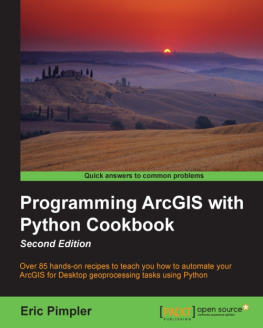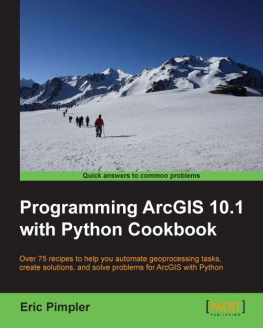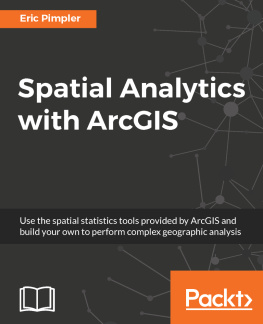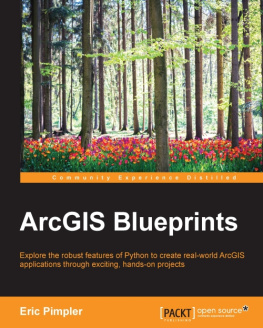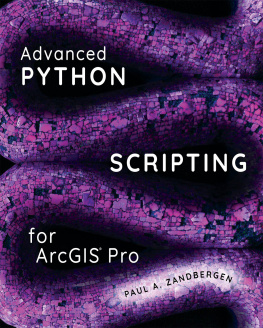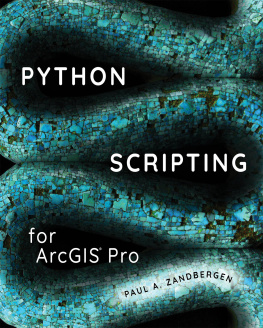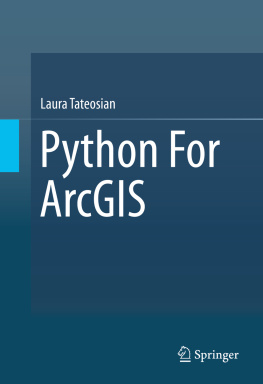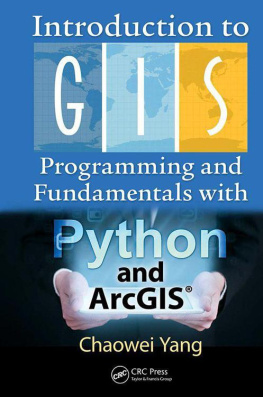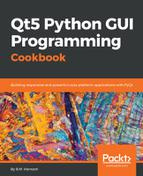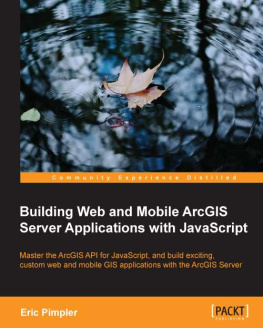Eric Pimpler - Programming ArcGIS with Python Cookbook - Second Edition
Here you can read online Eric Pimpler - Programming ArcGIS with Python Cookbook - Second Edition full text of the book (entire story) in english for free. Download pdf and epub, get meaning, cover and reviews about this ebook. year: 2015, publisher: Packt Publishing, genre: Computer. Description of the work, (preface) as well as reviews are available. Best literature library LitArk.com created for fans of good reading and offers a wide selection of genres:
Romance novel
Science fiction
Adventure
Detective
Science
History
Home and family
Prose
Art
Politics
Computer
Non-fiction
Religion
Business
Children
Humor
Choose a favorite category and find really read worthwhile books. Enjoy immersion in the world of imagination, feel the emotions of the characters or learn something new for yourself, make an fascinating discovery.
- Book:Programming ArcGIS with Python Cookbook - Second Edition
- Author:
- Publisher:Packt Publishing
- Genre:
- Year:2015
- Rating:3 / 5
- Favourites:Add to favourites
- Your mark:
- 60
- 1
- 2
- 3
- 4
- 5
Programming ArcGIS with Python Cookbook - Second Edition: summary, description and annotation
We offer to read an annotation, description, summary or preface (depends on what the author of the book "Programming ArcGIS with Python Cookbook - Second Edition" wrote himself). If you haven't found the necessary information about the book — write in the comments, we will try to find it.
Programming ArcGIS with Python Cookbook - Second Edition — read online for free the complete book (whole text) full work
Below is the text of the book, divided by pages. System saving the place of the last page read, allows you to conveniently read the book "Programming ArcGIS with Python Cookbook - Second Edition" online for free, without having to search again every time where you left off. Put a bookmark, and you can go to the page where you finished reading at any time.
Font size:
Interval:
Bookmark:
Copyright 2015 Packt Publishing
All rights reserved. No part of this book may be reproduced, stored in a retrieval system, or transmitted in any form or by any means, without the prior written permission of the publisher, except in the case of brief quotations embedded in critical articles or reviews.
Every effort has been made in the preparation of this book to ensure the accuracy of the information presented. However, the information contained in this book is sold without warranty, either express or implied. Neither the author, nor Packt Publishing, and its dealers and distributors will be held liable for any damages caused or alleged to be caused directly or indirectly by this book.
Packt Publishing has endeavored to provide trademark information about all of the companies and products mentioned in this book by the appropriate use of capitals. However, Packt Publishing cannot guarantee the accuracy of this information.
First published: February 2013
Second edition: July 2015
Production reference: 1230715
Published by Packt Publishing Ltd.
Livery Place
35 Livery Street
Birmingham B3 2PB, UK.
ISBN 978-1-78528-289-8
www.packtpub.com
Author
Eric Pimpler
Reviewers
Mohammed Alhessi
Matthew Bernardo
Rahul Bhosle
Kristofer Lasko
Doug McGeehan
Ann Stark, GISP
Commissioning Editor
Akram Hussain
Acquisition Editors
Kevin Colaco
Usha Iyer
Greg Wild
Rebecca Youe
Content Development Editor
Adrian Raposo
Technical Editor
Shivani Kiran Mistry
Copy Editor
Sonia Michelle Cheema
Project Coordinator
Sanchita Mandal
Proofreader
Safis Editing
Indexer
Mariammal Chettiyar
Graphics
Disha Haria
Production Coordinator
Nilesh R. Mohite
Cover Work
Nilesh R. Mohite
Eric Pimpler is the founder and owner of GeoSpatial Training Services (http://geospatialtraining.com/) and has over 20 years of experience implementing and teaching GIS solutions using Esri, Google Earth/Maps, open source technology. Currently, Eric is focusing on ArcGIS scripting with Python and the development of custom ArcGIS Server web and mobile applications using JavaScript. Eric is the author of Programming ArcGIS with Python Cookbook and Building Web and Mobile ArcGIS Server Applications with JavaScript , both by Packt Publishing .
Eric has a bachelor's degree in geography from Texas A&M University and a master's degree in applied geography with a focus on GIS from Texas State University.
Mohammed Alhessi is a GIS professional and instructor who is interested in geospatial theory, algorithms, and applications. He has a good amount of experience in GIS analysis, development, and training. He has conducted quite a few training courses for people from different backgrounds. The courses have been diverse in terms of subjects and have included, but are not limited to, Enterprise Geodatabase Administration in MS SQL Server, spatial data analysis and modeling, and Python scripting for ArcGIS.
He has worked at the University of Stuttgart as a GIS developer, where he programmed Geoprocessing tools using Java and Python. He is involved in many local GIS projects, providing consultancy for the local community. He is currently a lecturer at the Islamic UniversityGaza, Palestine. He also holds classes at University College of Applied Sciences, Gaza.
Mohammed has a master's degree in geomatics engineering from the University of Stuttgart. He also has a bachelor's degree in civil engineering from the Islamic UniversityGaza.
Matthew Bernardo is the senior GIS analyst at Newport Renewables, a renewable energy firm based in Newport. An avid outdoorsman and technophile, he is drawn to the assimilation of environment and technology that GIS offers. Over the last few years, he has used GIS and Python programming to answer complex questions in many fields, including renewable energy, intelligence analysis, remote sensing, marine science, environmental science, and town planning.
He has a BS in environmental science from the University of Rhode Island and a graduate certificate in geospatial intelligence from Penn State.
Rahul Bhosle earned his bachelor of engineering degree in information technology from Shivaji University, India, and a master of geospatial information science and technology from North Carolina State University. Currently, he is a Geospatial Developer at GIS Data Resources, Inc. By profession, he is a geospatial developer. He has experience in the fields of Python, JavaScript, ArcGIS Suite, GeoServer, PostGIS, PostgreSQL, SQL Server, Leaflet, Openlayers, Machine Learning, and NoSQL.
Kristofer Lasko earned his bachelor's degree in geographical sciences from the University of Maryland. He subsequently earned a master's degree in geospatial information science from the University of Maryland. He teaches a graduate and undergraduate GIS course at the University of Maryland. He began learning about Python several years ago, when he found it necessary to automate mundane tasks as well as process large volumes of geospatial data.
He is currently a PhD student at the University of Maryland, where he's studying geographical sciences. He has previously worked at NASA's Goddard Space Flight Center and NASA's Jet Propulsion Lab. He has also worked as a GIS and remote sensing analyst at the University of Maryland. His current research focuses on the burning of crop residue in Vietnam.
His website can be viewed at http://terpconnect.umd.edu/~klasko/cv.html.
Doug McGeehan is a third year PhD student at the Missouri University of Science and Technology in Rolla, Missouri, USA, where he's studying computer science under the supervision of Dr Sanjay Madria and Dr Dan Lin. In 2013, he received his bachelor's degree in computer science from Missouri University of Science and Technology, having already published two papers in computational geometry and working as a computational cartographer for the United States Geological Survey (USGS).
Ann Stark , a GISP since 2005, has been active in the GIS profession for 20 years. She is passionate about GIS and is an active and engaging member of the GIS community in the Pacific Northwest of the United States, coordinating local user groups and serving as the president of the region's GIS professional group. She is an enthusiastic teacher who explains how to effectively use Python with ArcGIS and maintains a blog devoted to the topic at https://gisstudio.wordpress.com/. She co-owns a GIS consulting business, Salish Coast Sciences, which provides strategic planning, process automation, and GIS development services.
To unwind from technology, Ann enjoys spending time with her husband and son at their urban farm in the heart of the city, where they seek to live sustainably and as self-sufficiently as an urban farm allows.
For support files and downloads related to your book, please visit www.PacktPub.com.
Did you know that Packt offers eBook versions of every book published, with PDF and ePub files available? You can upgrade to the eBook version at > for more details.
Font size:
Interval:
Bookmark:
Similar books «Programming ArcGIS with Python Cookbook - Second Edition»
Look at similar books to Programming ArcGIS with Python Cookbook - Second Edition. We have selected literature similar in name and meaning in the hope of providing readers with more options to find new, interesting, not yet read works.
Discussion, reviews of the book Programming ArcGIS with Python Cookbook - Second Edition and just readers' own opinions. Leave your comments, write what you think about the work, its meaning or the main characters. Specify what exactly you liked and what you didn't like, and why you think so.

